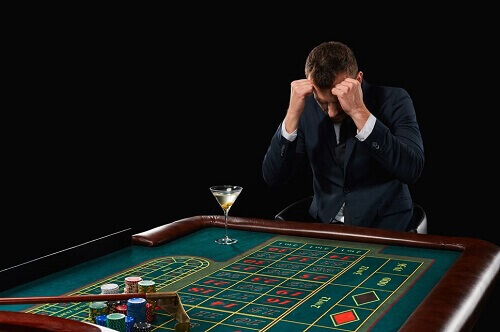Dave | November 2, 2023 | Updated on: January 29th, 2024
Gambling addiction is a serious issue that affects a number of gamblers around the world. While most people who gamble do so for fun and never have any issues with it, a small percentage of players do become addicted to gambling. Online gambling can make the problem even worse, as it is easier for them to hide ad they can gamble whenever they want to. If left unchecked, an addiction to gambling can ruin a person’s life as it destroys their family and their financial security.

Gambling Addiction – What is it?
From a medical standpoint, a gambling addiction has many similarities to other impulse control disorders. This means that the person is unable to control themselves or stop themselves, even if they are fully aware of the negative consequences of their continued action. Other impulse-control disorders include things like kleptomania (compulsive stealing) and pyromania (setting fires for fun).
It does get a little bit more complicated though, as there are different categories of gambling addicts and some are more severe than others. There’s even some evidence to suggest it affects men and women differently. We have listed the three most common types of gambling addicts below.
The Compulsive Gambler
The is perhaps the most recognizable form of gambling addiction, and also the most dangerous. People who suffer from compulsive gambling have no control over their gambling and tend to sink huge sums of money into casinos. It doesn’t matter if they need that money for food, rent, or car payments. Even if they’re aware how much they hurt themselves and their families if they lose the money, they’ll risk it anyway.
The Binge Gambler
The binge gambler is very similar in some ways to the compulsive gambler. However, there are some differences. Binge gamblers also lack control and will spend money regardless of what they need it for.
The difference is that binge gamblers do this from time to time. They might go months without gambling, but once they start, they may as well be a compulsive gambler.
The Problem Gambler
The problem gambler is the least severe of these examples. Problem gamblers are not completely addicted to wagering money at a casino. However, their gambling still causes them problems. Problem gamblers typically chase their losses at a casino and lie to friends and family to hide their gambling.
How Big of a Problem is Gambling Addiction?
The good news is that most gamblers will be fine. There have been countless studies done around the world, and the results from these studies tend to line up quite well. These studies have shown that between 2% and 3% of gamblers will become problem gamblers, with around 1% of gamblers actually becoming compulsive gamblers.
It must be noted though that this number is often higher in areas where gambling is a bigger part of the culture. This is especially true in places like Las Vegas and Atlantic City. Some worry as online casinos become more common, the issues could get even worse.
Identifying Someone with a Gambling Addiction Problem
Identifying a friend, family member, or yourself as a problem gambler is the first step to overcoming the issue. Unfortunately, the signs can be difficult to see and sometimes are easy to hide. We’ve put a list together that might help you identify someone who is developing, or has developed, a gambling problem. If you see these signs in yourself, or someone close to you, seek help as quickly as possible.
- A person feels annoyed or agitated when they can’t gamble, or are trying to cut back.
- A player who will chase their losses, regardless of the cost.
- When a person constantly has gambling on their mind and is thinking about the next time they can gamble.
- Gambling is used as escape, to forget about real world problems.
- Will lie to hide their gambling from those close to them.
- Someone who feels the need to risk more and more money to get the same thrills.
- Will try and use friends and family to help bail them out of gambling losses.
- Someone who needs to turn to crime in order to find it.
- A player who has tried on multiple occasions to stop gambling, but always fails to do so.
If these describe you or someone you love, seek assistance immediately. Every state has dedicated gambling support websites and hotlines, who can put you in touch with problem gambling counselling and support. We’d also recommend looking into self-exclusion to assist problem gamblers.
Gambling Addiction Help Resources
If you or someone you know is struggling with Gambling, we urge to you please reach out for assistance. Here are a number of Problem Gambling help resources available.
National Council on Problem Gambling (NCPG)
- Website: NCPGambling.org
- Call or text: 1-800-522-4700
- Live chat: NCPGambling.org/chat
Gamblers Anonymous
- Website: GamblersAnonymous.org
- Call: The hotline numbers vary by state
Gam-Anon
- Website: Gam-Anon.org
- Call: 718-352-1671
- This is a 12-step program designed for the friends, spouses and loved ones of problem gamblers.
International Center for Responsible Gaming (NCRG)
- Website: ICRG.org
- Call: 978-338-6610
Association of Problem Gambling Service Administrators (APGSA)
- Website: APGSA.org
GamTalk
- Website: GamTalk.org
- GamTalk is an online support resource for those with gambling problems. It hosts a 24/7 chat room along with scheduled, moderated chats.
Gambling Therapy
- Website: GamblingTherapy.org
- This is an international online problem gambling website with live chat, e-mail support and active discussion forums.
24 Hour Confidential National Helpline
- Call 1-800-GAMBLER
- Chat 1800gamblerchat.org
- Text 800GAM
Recommended Reading:
- Responsible Gambling
- Responsible Gambling Tools
- Gambling Tips
- Gambling History
- Gambling Superstitions
- Lotteries
- Sports Betting


